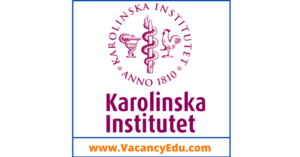Karolinska Institute, Sweden invites online Application for number of Fully Funded PhD Degree at various Departments. We are providing a list of Fully Funded PhD Programs available at Karolinska Institute, Sweden.
Eligible candidate may Apply as soon as possible.
(01) PhD Degree – Fully Funded
PhD position summary/title: Doctoral (PhD) student position in research about cancer and mental illness
Cancer and mental illness (e.g., psychiatric disorders and neurodevelopmental disorders) are two major contributors to the disease burden of our society. We are interested in studying the comorbidity of cancer and mental illness. Specifically, we are planning a multinational study with extensive epidemiological and genetic data across the countries of Sweden, Denmark, and the UK to examine comprehensively the disease-specific associations between mental illnesses and different cancer types, focusing on exploring potential underlying mechanisms. The current doctoral project will be led by Professor Fang Fang (main supervisor, https://ki.se/en/people/fang-fang ). As a doctoral student, you are expected to take a leading role in your entire research process under the supervision of your PhD supervisors. Through participating in study design, data processing and analysis, interpretation and communication of findings, taking relevant courses and participate in seminars and journal clubs, the student is expected to accomplish the doctoral thesis project and grow into an independent researcher at the end of the study.
Deadline :01.Apr.2024
(02) PhD Degree – Fully Funded
PhD position summary/title: Doctoral (PhD) student position in bone pain research
Rheumatoid arthritis is marked by persistent joint pain, accompanied by the degradation of bone and cartilage. Strikingly, the joint pain often becomes chronic, persisting even when the disease activity is low. Several studies using preclinical models have revealed compelling links between nociception and bone resorption. Building on this foundation, the objective of this PhD thesis project is to investigate the role of osteoclasts in pain regulation, using two different approaches to induce arthritis in mice; injection of collagen type II antibodies or IgG isolated from individuals with RA. The student will work from both a cellular. The student will learn several techniques for analysis of joint pathology and bone erosion and immunological and molecular biological tools. The project also includes in vivo behavioural assays and analysis of patient samples. The student will be part of a larger research network in Stockholm and EU consisting of preclinical and clinical researchers.
Deadline : 08 Mar 2024
View All Fully Funded PhD Positions Click Here
(03) PhD Degree – Fully Funded
PhD position summary/title: PhD doctoral position examining long non-coding RNA function within fat cells
This doctoral project will explore how lncRNAs regulate lipid breakdown and in turn type-2 diabetes pathogenesis. The student will use omics and white adipose tissue clinical phenotype data to uncover novel lncRNAs associated to lipid breakdown. The student will progress these lncRNAs into molecular studies in human adipocytes, where they will use advanced molecular gene perturbation systems and in-house developed molecular methodology to uncover how these lncRNAs function at a molecular resolution. The doctoral student will be trained in how to examine clinical data to identify candidate lncRNAs and develop an investigational pipeline to understand how they function. The student will be involved in learning from current lab members and teaching future lab members that will be hired.
Deadline : 07.Mar.2024
(04) PhD Degree – Fully Funded
PhD position summary/title: PhD doctoral position examining long non-coding RNA function within fat cells
This doctoral project will explore how lncRNAs regulate lipid breakdown and in turn type-2 diabetes pathogenesis. The student will use omics and white adipose tissue clinical phenotype data to uncover novel lncRNAs associated to lipid breakdown. The student will progress these lncRNAs into molecular studies in human adipocytes, where they will use advanced molecular gene perturbation systems and in-house developed molecular methodology to uncover how these lncRNAs function at a molecular resolution. The doctoral student will be trained in how to examine clinical data to identify candidate lncRNAs and develop an investigational pipeline to understand how they function. The student will be involved in learning from current lab members and teaching future lab members that will be hired.
Deadline : 07.Mar.2024
(05) PhD Degree – Fully Funded
PhD position summary/title: Doctoral (PhD) student in data-driven imaging, bioinformatics, and experimental biology for personalized atherosclerotic risk prediction
The overall goal of the proposed project is to investigate clinical, diagnostic, and molecular features of tissue hypoxia, angiogenesis and intraplaque haemorrhage (IPH) in relation to stroke risk, seeking to improve on current paradigms for clinical risk predictions and individualize diagnostic precision. Improving atherosclerotic risk prediction has been a primary focus of our team’s efforts over the last couple of decades, seeking insights into pathways steering plaque instability, as well as identifying novel biomarkers improving on clinical routine. A cornerstone of these developments lies in the Biobank of Karolinska Endarterectomies (BiKE); established by our group and where clinical, radiological, histological, and complete genomic, transcriptomic and proteomic profiling of plaque tissue and plasma exist from over 1000 patients, together representing the world’s largest resource for molecular characterization of human atherosclerosis. The PhD student project will use data available in the BiKE resource to explore the hypothesis surrounding IPH, leveraging image and bioinformatic analysis to extract correlations between clinical, radiological, and underlying biology in combination with an array of experimental investigations. Lastly, prediction models encompassing novel markers of IPH and IPH-related plaque risk will be invoked, with data-driven methods explored and implemented by the student.
Deadline :07.Mar.2024
Polite Follow-Up Email to Professor : When and How You should Write
Click here to know “How to write a Postdoc Job Application or Email”
(06) PhD Degree – Fully Funded
PhD position summary/title: Doctoral (PhD) student in brain and spinal cord childhood cancer
We are mainly focusing our research on so-called ependymomas, which is one of the most common types of tumors in the brain and spinal cord. We compare ependymoma subtypes of different severity using multi-omics analyses of tumor samples to acquire a better understanding of the cell types present in the tumors, and the patterns of gene expression in various cell types. We are particularly interested in the cancer stem cells, the type of cells that are relatively resistant to treatment, and that give rise to recurring tumors and daughter tumors. We also culture tumor cells to be able to change their gene expression and control critical features of the cells. Tumor cells are also transplanted to mice to be able to study in detail the tumor cells over longer time periods, how they develop and change in an environment that resembles the conditions in the patient. Key questions in our research are the role of cancer stem cells, the molecular-genetic control of self-renewal of these cells, their transition in and out of quiescence and to more differentiated phenotypes.
As a PhD student you will learn a variety of techniques for gene expression analysis including the bioinformatical tools to analyze the data you acquire. You will use cell culture techniques, isolate cells with FACS, and apply reporter genes for this purpose. You will learn animal surgery and apply methods for stereotaxic injections to transplant tumor cells to mice, which may be monitored with magnetic resonance imaging (micro-MRI) or other imaging techniques. You will participate in designing your experiments, and most importantly, you will learn how to critically evaluate your results and relate them to previously published research data.
Deadline : 05.Mar.2024
(07) PhD Degree – Fully Funded
PhD position summary/title: Doctoral (PhD) student position in immunology
B and T lymphocytes express highly polymorphic receptors encoded by genes that recombine in a combinatorial manner during lymphocyte development. This project will use high throughput genotyping techniques to investigate germline-encoded variations in T and B cell receptor genes and how they influence responses in autoimmune inflammatory diseases.
Deadline : 27.Feb.2024
(08) PhD Degree – Fully Funded
PhD position summary/title: Doctoral student – Hippocampal neurogenesis and long-term memory
Episodic memory, our long-term memory of specific events, declines with age and shows large inter-individual differences. The hippocampus is crucial for the encoding, consolidation, and retrieval of episodic memories. Meanwhile, adult neurogenesis, the formation of new neurons, occurs in the dentate gyrus of the hippocampus and also declines with advancing age. Animal data have shown that hippocampal neurogenesis is crucial for two cognitive processes key to episodic memory: pattern separation, which prevents confusion between similar memories, and reactivation, which supports consolidation. Additionally, neurogenesis is important for mental health, specifically depression. However, data in humans are lacking due to the difficulty of measuring neurogenesis non-invasively. Due to groundbreaking developments in magnetic resonance imaging, it has very recently become possible to detect the neurogenic signal in vivo.
Deadline : 26.Feb.2024
Click here to know “How to Write an Effective Cover Letter”
(09) PhD Degree – Fully Funded
PhD position summary/title: Doctoral (PhD) student position in Nutritional Epidemiology
The research performed by the doctoral student will include studies on the health and environmental impacts of following dietary guidelines. The project will utilize data from prospective cohort studies that include questionnaire and biomarker data. The doctoral student is expected to acquire broad knowledge and systematic understanding of the main research fields encompassed in the thesis work including molecular pathways influenced by the exposure, epidemiological theory and principles, and exposure assessment science. This will be accomplished through working on the project under supervision, taking relevant courses and participate in seminars and journal clubs. The student is also expected to acquire in-depth experience in the epidemiological methods applied, statistical computation and statistical software packages such as R and Stata in processing of data; further, to develop excellent scientific writing and deliver high-quality publications in international peer-reviewed journals and give presentations at scientific meetings and conferences.
Deadline : 26.Feb.2024
(10) PhD Degree – Fully Funded
PhD position summary/title: Doctoral (PhD) student position in heart regeneration
Our research group has established a salamander heart regeneration model and identified an important role for tight junction remodelling in guiding heart muscle cell restoration. The PhD project aims to deepen our understanding of the role of tight junctions in salamander heart regeneration through analysis of tight junction interactome and changes in cell composition and expression patterns upon modulation of tight junctions. Student will be involved in generation and analysis of large datasets encompassing various stages of successful and impaired heart regeneration. Emphasis will be on gaining a systems-level understanding of heart regeneration. The successful candidate will be integrated in a multidisciplinary team comprising molecular and cellular biologists and physicists.
Deadline : 22.Feb.2024
Connect with Us for Latest Job updates
(11) PhD Degree – Fully Funded
PhD position summary/title: PhD position in Health Economics and Biostatistics
The European Commission recently recommended that European Union member states investigate the stepwise introduction of prostate cancer screening programmes using magnetic resonance imaging (MRI) together with possible ancillary tests. In line with and preceding this recommendation, the Confederation of Regional Cancer Centres in Sweden initiated population-based organised prostate cancer testing (OPT) projects in multiple regions. As a part of the Swedish Consortium for Research on Organised Prostate Cancer Testing (SweCROPT) working group (WG) for Health Economics, our group is looking for a PhD student who can plan and conduct research projects under supervision.
The overarching aims of this project are: (a) to investigate how to reduce the healthcare utilisation and societal burden due to prostate cancer through clinically effective and cost-effective risk-adapted organised testing and; (b) to provide reliable evidence to Swedish clinicians and policy makers to develop and evaluate the current OPT projects using simulations and health economic evaluations. The project will include research aimed at investigating: the cost-effectiveness of an organised prostate cancer testing with evidence on the subsequent rescreening from screening trials (e.g. STHLM3-MRI, STHLM3MRI-Reinvite) and registers (doctoral project 1); extending a current microsimulation model to incorporate the current opportunistic testing practice and the risk-adapted screening practice (doctoral project 2); evaluating the cost-effectiveness of an opt-in national prostate cancer screening program using the OPT base algorithm, together with other biopsy strategies and ancillary tests in Sweden (doctoral projects 3 and 4); and assessing the short-term budget impact on implementing a national screening program using the OPT base algorithm and alternative strategies in Sweden (doctoral project 5).
Deadline : 21.Feb.2024
Polite Follow-Up Email to Professor : When and How You should Write
About The Karolinska Institute, Sweden – Official Website
The Karolinska Institute sometimes known as the (Royal) Caroline Institute in English is a research-led medical university in Solna within the Stockholm urban area of Sweden. The Nobel Assembly at the Karolinska Institute awards the Nobel Prize in Physiology or Medicine. The assembly consists of fifty professors from various medical disciplines at the university. The current rector of Karolinska Institute is Ole Petter Ottersen, who took office in August 2017.
The Karolinska Institute was founded in 1810 on the island of Kungsholmen on the west side of Stockholm; the main campus was relocated decades later to Solna, just outside Stockholm. A second campus was established more recently in Flemingsberg, Huddinge, south of Stockholm.
The Karolinska Institute is Sweden’s third oldest medical school, after Uppsala University (founded in 1477) and Lund University (founded in 1666). It is one of Sweden’s largest centres for training and research, accounting for 30% of the medical training and more than 40% of all academic medical and life science research conducted in Sweden.
The Karolinska University Hospital, located in Solna and Huddinge, is associated with the university as a research and teaching hospital. Together they form an academic health science centre. While most of the medical programs are taught in Swedish, the bulk of the PhD projects are conducted in English. The institute’s name is a reference to the Caroleans.
Disclaimer: We try to ensure that the information we post on VacancyEdu.com is accurate. However, despite our best efforts, some of the content may contain errors. You can trust us, but please conduct your own checks too.
Related Posts
- PhD Degree (34)-Fully Funded at Loughborough University, Leicestershire, England

- PhD Degree (15)-Fully Funded at University of Southern Denmark, Denmark

- PhD Degree (24)-Fully Funded at Forschungszentrum Julich, Germany

- PhD Degree (08)-Fully Funded at Vrije University Amsterdam, Netherlands

- PhD Degree (27)-Fully Funded at Nottingham Trent University (NTU), England

- PhD Degree (24)-Fully Funded at University of Oslo, Norway

- PhD Degree (04)-Fully Funded at Masaryk University, Czech Republic

- PhD Degree (29)-Fully Funded at University of Oslo, Norway

- PhD Degree (13)-Fully Funded at University of Stavanger, Norway










